Rev Up Your Knowledge – The Beginner's Guide to Car Engine Performance Tuning
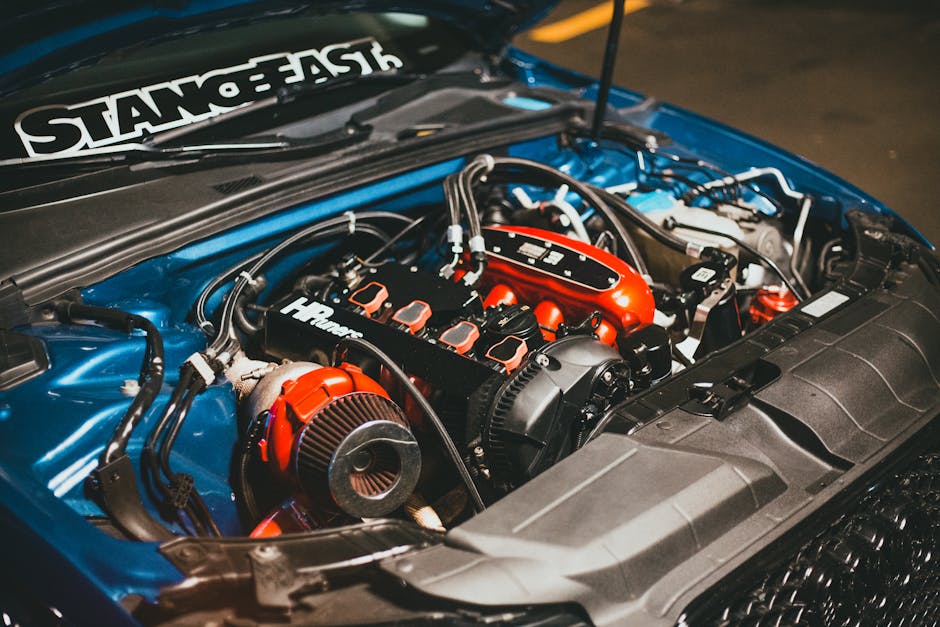
What is Engine Tuning and Why Bother?
Car engine performance tuning is the art and science of modifying a vehicle's engine control unit (ECU) and select hardware components to open up performance potential the factory left on the table. The result? More horsepower, increased torque, better fuel economy, and a sharper throttle response—all achieved without compromising the everyday reliability you depend on.
Quick Answer: What Is Car Engine Performance Tuning?
- ECU remapping for precise fuel, ignition, and boost control
- Optional hardware upgrades like intakes, exhausts, and forced-induction components
- Key goals: maximizing horsepower, torque, efficiency, and overall drivability
- Typical gains: up to 30% more power and a potential 20% improvement in fuel economy
- A specialized job best left to trained professionals using advanced diagnostic and tuning tools
So, why do manufacturers hold their engines back in the first place? It's a balancing act. They must design a single engine tune that works reliably across the globe, accounting for vast differences in climate, altitude, fuel quality (from premium to regular), and stringent emissions regulations in various markets. This one-size-fits-all approach means they must adopt conservative settings to ensure a 200,000-mile lifespan for every driver, from the cautious commuter to the aggressive enthusiast. For those of us in Southern California, this means there's significant, safe potential waiting to be releaseed.
Performance Tuning vs. a Standard Tune-Up
It's crucial to distinguish performance tuning from a routine tune-up. A standard tune-up is about maintenance; it restores the engine to its original factory specifications by replacing parts like spark plugs, oils, and filters. Performance tuning, on the other hand, is about improvement. It deliberately and safely exceeds those factory specs by:
- Re-mapping the complex tables within the ECU
- Strategically raising boost pressure on turbocharged or boostd engines
- Improving airflow efficiency with less restrictive intake and exhaust systems
- Tailoring the engine's response characteristics to your specific driving style and needs
Benefits Beyond Bragging Rights
- Tangible Power & Torque: You'll feel the difference immediately, whether merging onto a busy freeway in Los Angeles or accelerating up a steep grade.
- Improved Fuel Efficiency: A more efficient engine burns fuel more completely. This can lead to gains of up to 20%, saving you money at the pump—a significant benefit with California's gas prices.
- Instantaneous Throttle Response: Say goodbye to frustrating lag. The engine responds the moment you touch the pedal, making for a more connected and safer driving experience.
- Improved Driving Engagement: From a more satisfying engine note to a feeling of direct control, tuning makes every drive more enjoyable.
For premium brands like BMW, Mercedes-Benz, Porsche, and MINI, professional tuning lifts an already refined platform. It can transform your daily commute through Huntington Beach, Irvine, or Newport Beach from a chore into a genuinely special experience.
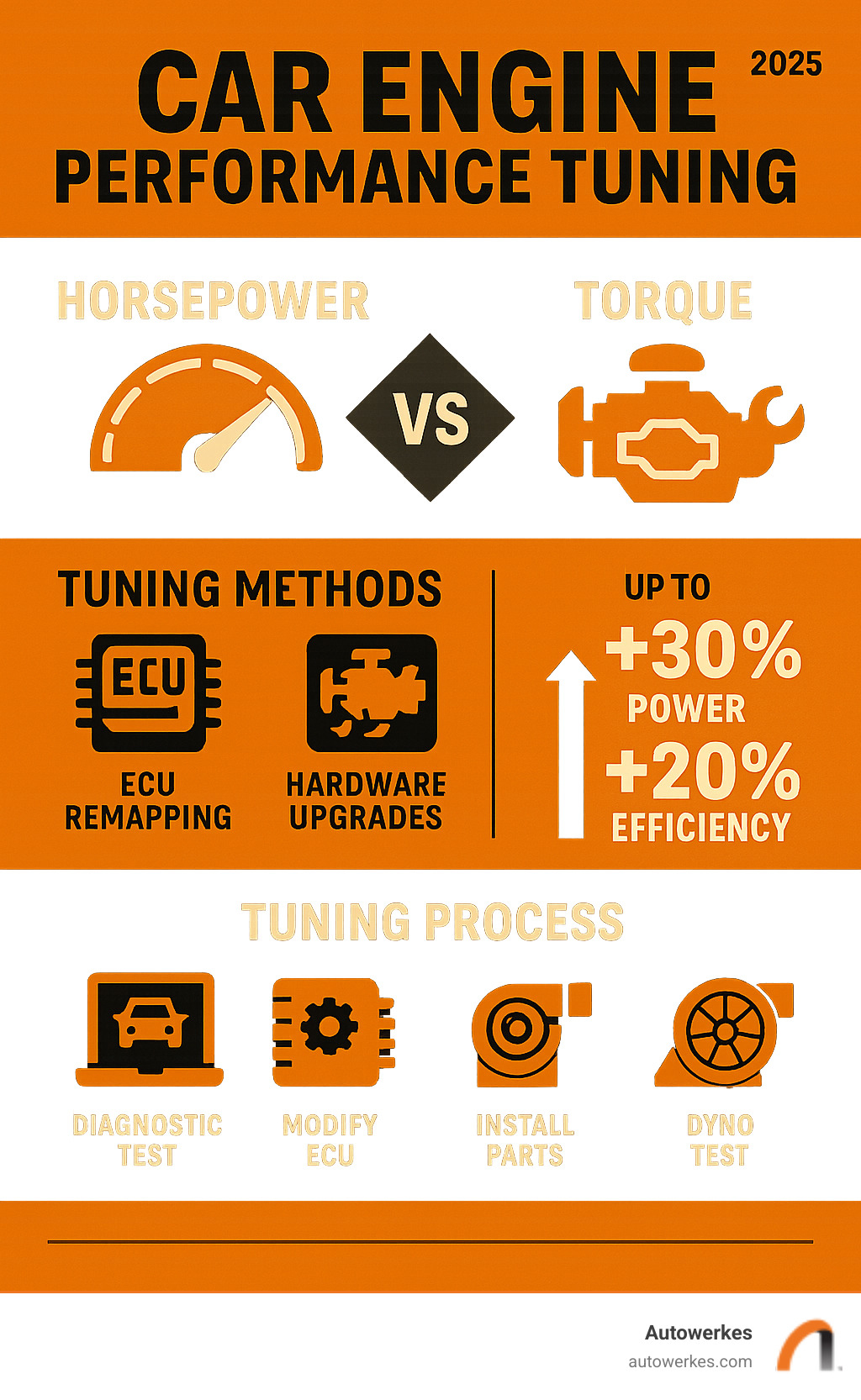
Helpful resources:
The Core of Car Engine Performance Tuning
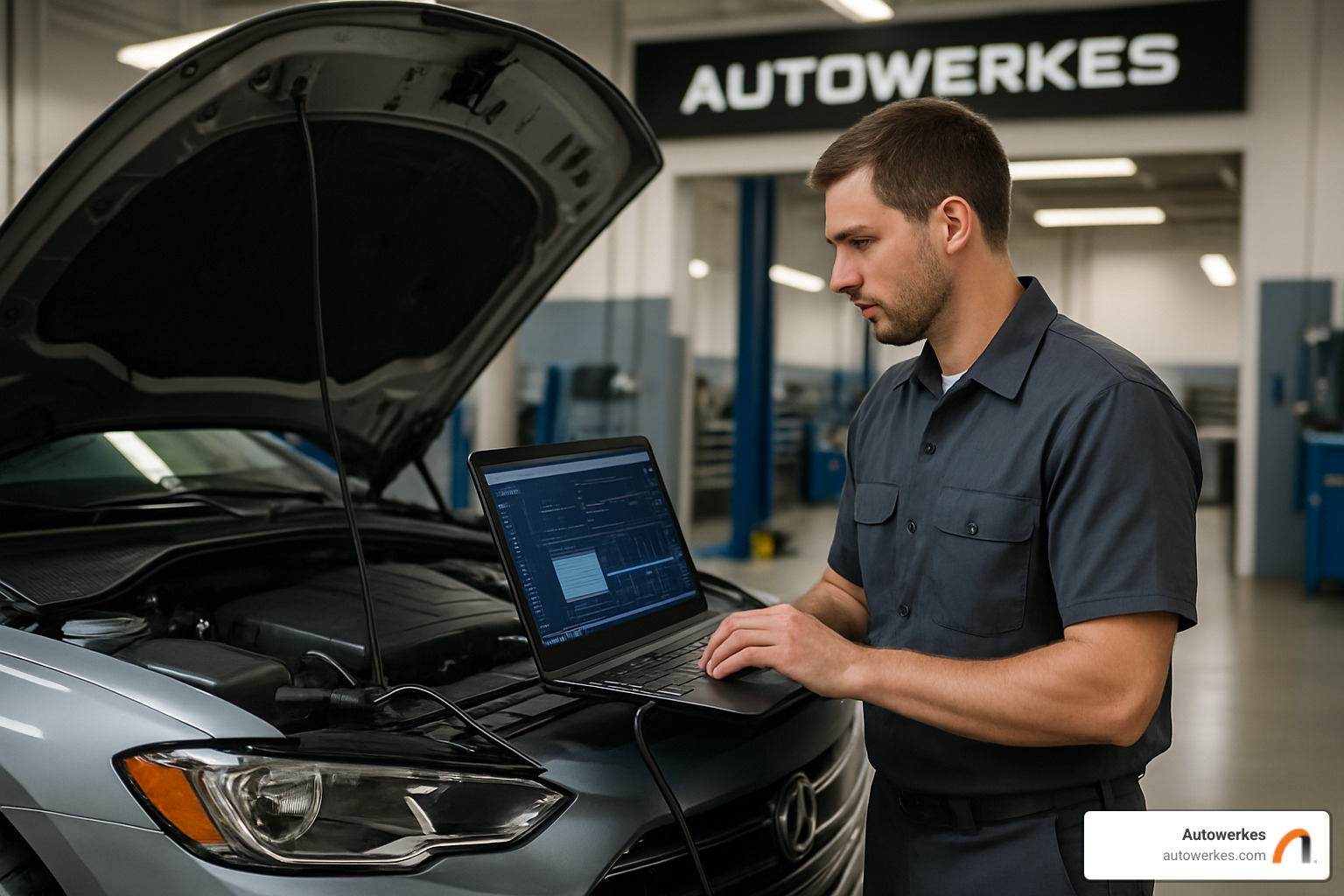
Think of your Engine Control Unit (ECU) as a conservative conductor directing an orchestra. It manages critical parameters like air-fuel ratios, ignition timing, and boost pressure to a safe, universal rhythm. Professional tuning rewrites the musical score, allowing the orchestra—your engine—to play louder, cleaner, and with more passion.
Modern performance work generally follows two complementary paths, often categorized into "stages":
- Digital Optimization (ECU Remapping): The brain of the operation.
- Mechanical Upgrades: Improving the engine's ability to breathe.
The Digital Wrench: ECU Remapping and Staged Tuning
Using the factory On-Board Diagnostics (OBD-II) port, a technician can read the stock engine map, precisely adjust it, and then "flash" the new software back onto the ECU. This recalibration optimizes:
- Air-fuel mixtures: Ensuring the most efficient and powerful combustion.
- Spark timing: Igniting the mixture at the perfect moment for maximum cylinder pressure.
- Boost limits: Safely increasing the pressure from a turbocharger or boostr.
This process is often broken down into stages:
- Stage 1: A software-only upgrade. The ECU is remapped to take better advantage of the stock hardware. It's the most common, cost-effective, and reliable way to get a significant performance boost. A Stage 1 remap on a modern BMW M3, for example, can yield an additional 100 PS and 100 Nm of torque while remaining reversible and emissions-compliant.
- Stage 2: This involves a Stage 1 remap plus supporting hardware like a high-flow intake and exhaust. These parts help the engine breathe more freely, allowing the tune to be more aggressive and open up even more power.
- Stage 3 & Beyond: These are for serious enthusiasts and involve major hardware changes like larger turbos, upgraded fuel systems (injectors and pumps), and reinforced engine internals. These builds require a completely custom tune.
The Mechanical Path: Hardware Upgrades
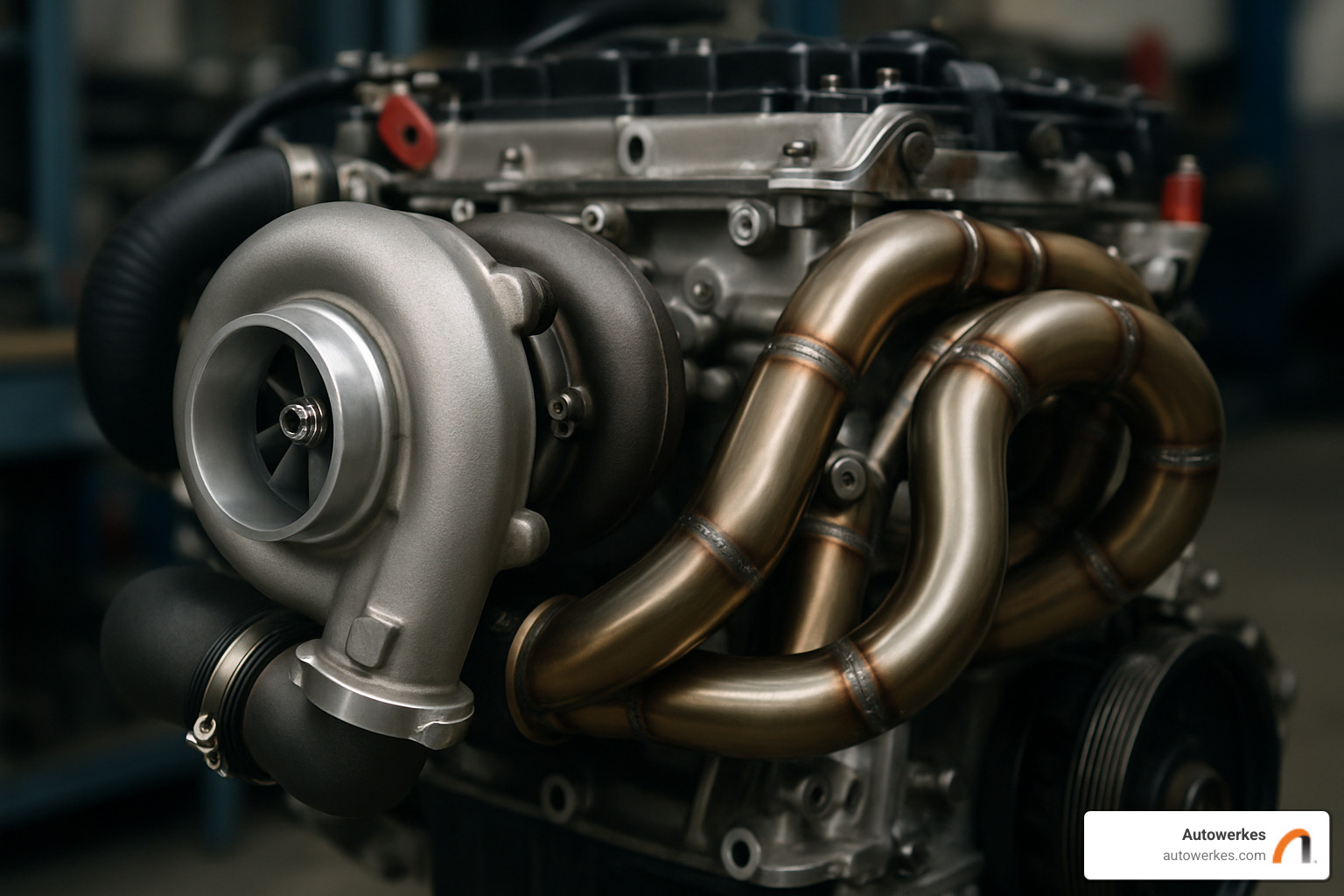
Hardware upgrades are about improving airflow efficiency. The more air an engine can move, the more fuel it can burn, and the more power it can make. Key components include:
- Cold-Air Intakes & High-Flow Exhausts: These act like bigger lungs. An intake brings in cooler, denser air, while a performance exhaust reduces backpressure, allowing exhaust gases to escape more easily. This lets the engine cycle more efficiently.
- Intercoolers: Essential for turbocharged cars. When air is compressed by a turbo, it gets hot. A larger, more efficient intercooler cools this "charge air" down before it enters the engine. Cooler air is denser and less prone to detonation, allowing for a more powerful and reliable tune.
- Turbocharger or Boostr Upgrades: The ultimate way to force more air into the engine for massive power gains.
- High-Flow Injectors & Fuel Pumps: When you add significantly more air, you need more fuel to match. These components ensure the engine doesn't run lean under high load.
Because premium European engines from BMW, Mercedes-Benz, Porsche, and MINI already feature sophisticated technology, even modest hardware upgrades paired with a professional ECU recalibration can deliver dramatic, reliable gains.
The Finish Line: From Theory to the Road
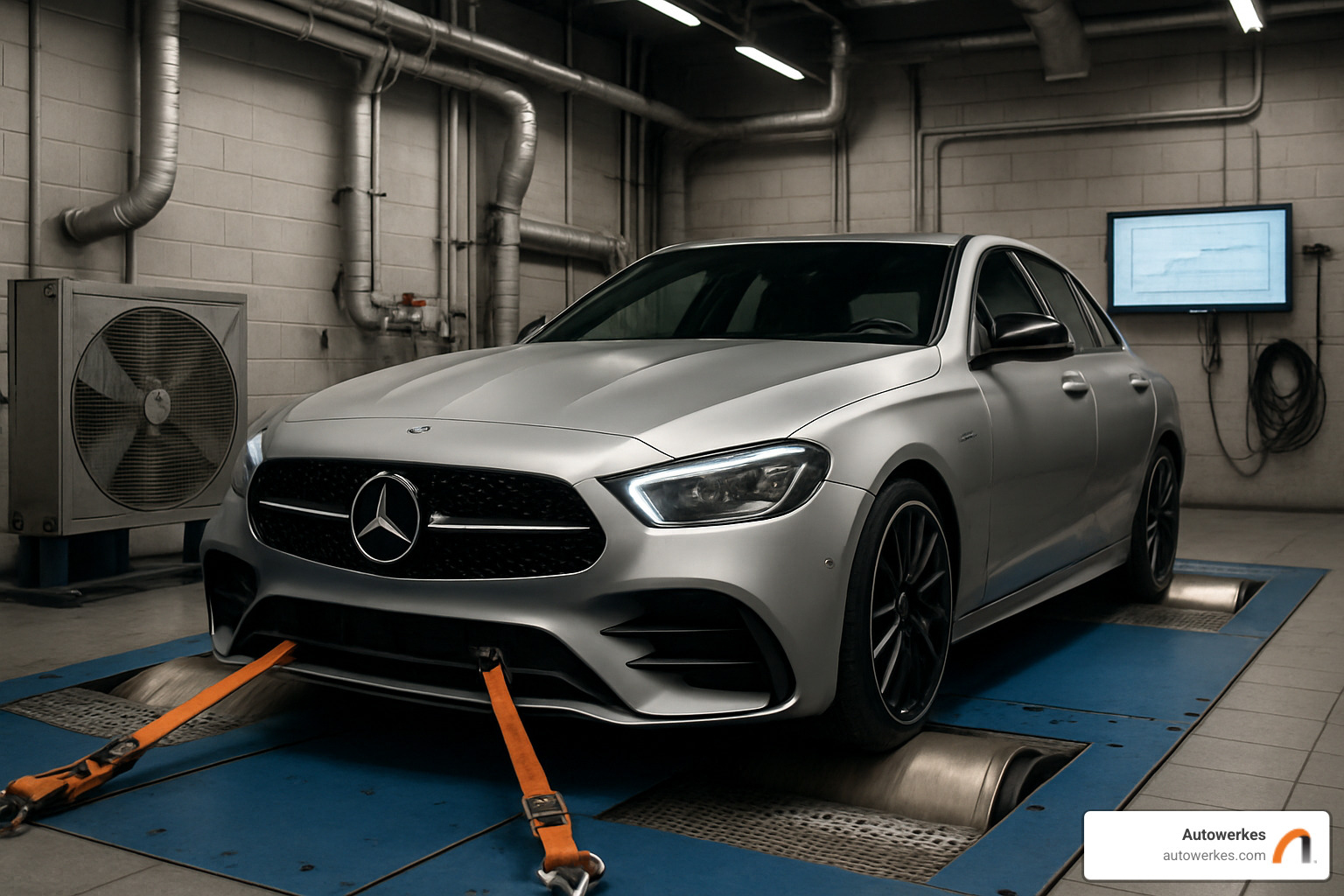
Implementing performance tuning safely and effectively isn't about guesswork; it demands a disciplined, data-driven process that prioritizes engine health as much as power output.
The Autowerkes Method
Our approach ensures repeatable, reliable results for your vehicle.
- Consultation & Goals: We start by listening. Is this your daily driver in Fountain Valley, a weekend track toy for Laguna Seca, or a balanced build for spirited canyon drives? Your goals define the project.
- Baseline Dyno & Diagnostics: Before any changes, we establish a baseline. Your car goes on our dynamometer (dyno) to measure its stock horsepower and torque. We also run a full diagnostic scan to confirm the engine is healthy and ready for tuning.
- ECU Remap & Hardware Installation: Our trained technicians expertly install any new hardware and then apply the calibrated software map to your ECU.
- Dyno Fine-Tuning: This is the most critical step. Back on the dyno, we run the car under load while monitoring key data points. Using wideband oxygen sensors, we carefully check the Air-Fuel Ratio (AFR) to ensure it's not running too lean (which can cause catastrophic engine damage) or too rich (which wastes fuel and power). We adjust the tune to achieve the ideal balance of power, efficiency, and safety margins.
- Road Validation: The final test is in the real world. We drive the car to ensure smooth starts, comfortable cruising, and powerful, consistent full-throttle acceleration in real traffic conditions.
This professional process, using tools like a chassis dynamometer, wideband sensors, and OEM-level flashing equipment, is what separates a safe, powerful tune from a risky gamble.
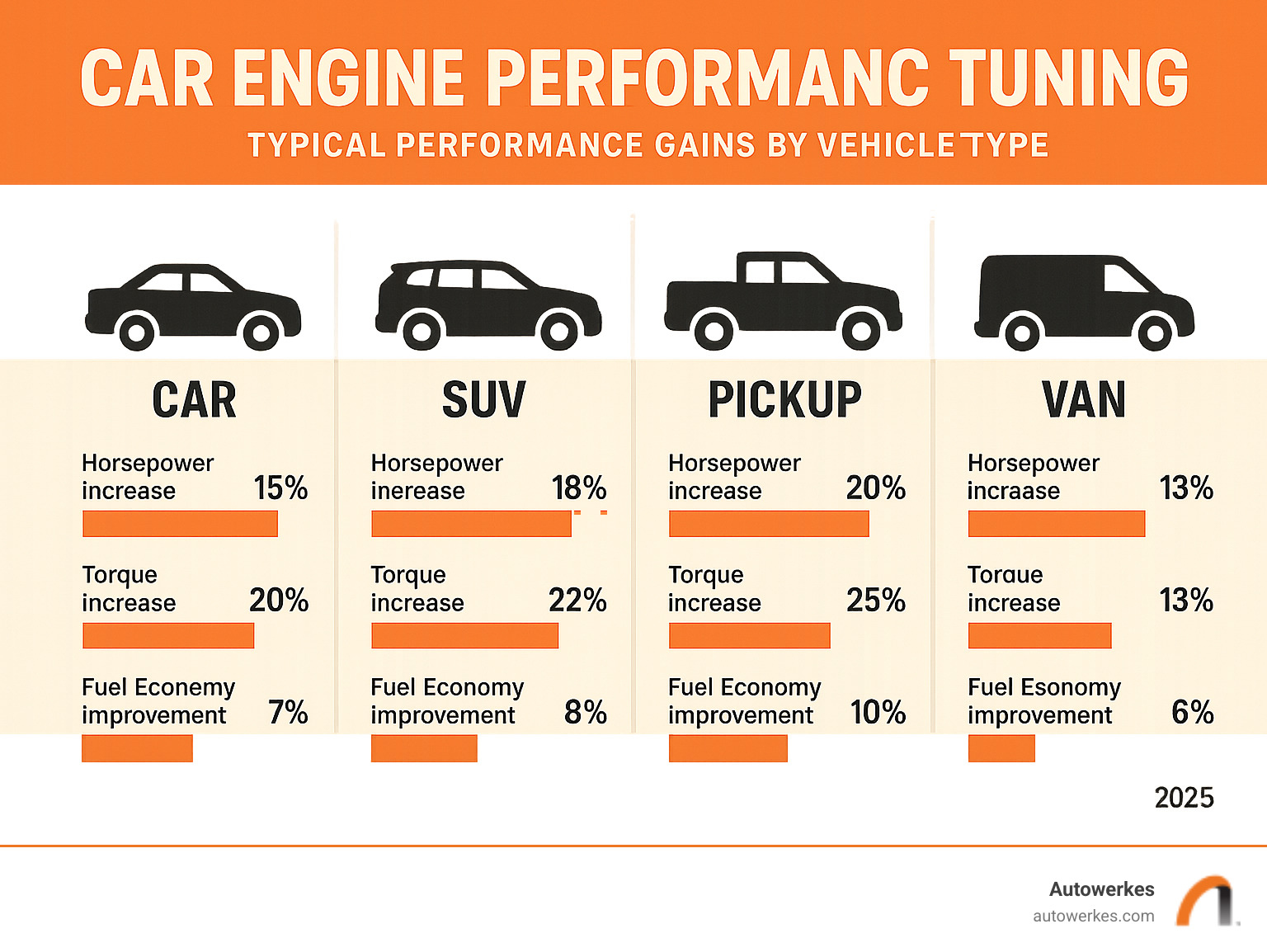
Smart Modifications: Legal & Practical Notes for California Drivers
While tempting, cheap, off-the-shelf DIY “chips” or amateur tunes can be disastrous, leading to dangerously lean air-fuel mixtures, voided warranties, or guaranteed emissions test failures. Professional tuning ensures peace of mind. In California, it's especially important to be mindful of emissions laws. A professional shop helps you:
- Pass Smog Checks: We prioritize using parts that are compliant with the California Air Resources Board (CARB). Many legal performance parts come with an Executive Order (EO) number, proving they have been tested and will not increase your vehicle's emissions.
- Retain Drivability: Your car will still behave perfectly in stop-and-go traffic, with all factory safety systems fully intact.
- Maintain Transparency: We provide clear documentation of all modifications, which is important for insurance purposes and future resale value.
Ready to Open up Your Car’s Potential?
Autowerkes proudly serves performance enthusiasts across Southern California, from Huntington Beach and Newport Beach to Irvine, Mission Viejo, and San Diego. Whether you're looking for a mild Stage 1 ECU flash for your daily driver or a comprehensive hardware and tuning package for your weekend warrior, our factory-trained technicians have the expertise to bring your vision to life.
Schedule Your Performance Tuning Appointment and feel the exhilarating difference on your next Pacific Coast Highway cruise.

.svg)



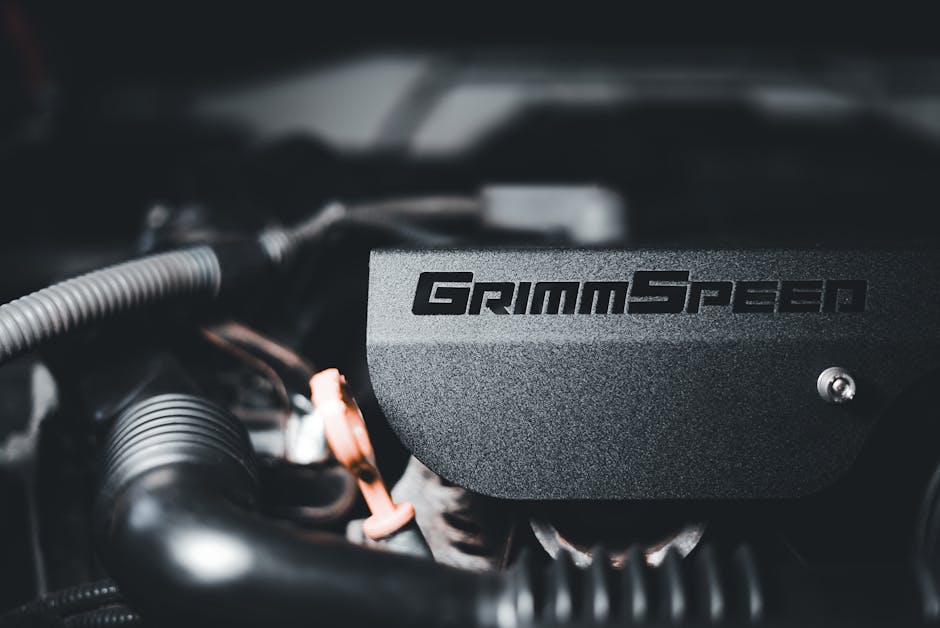
.jpg)